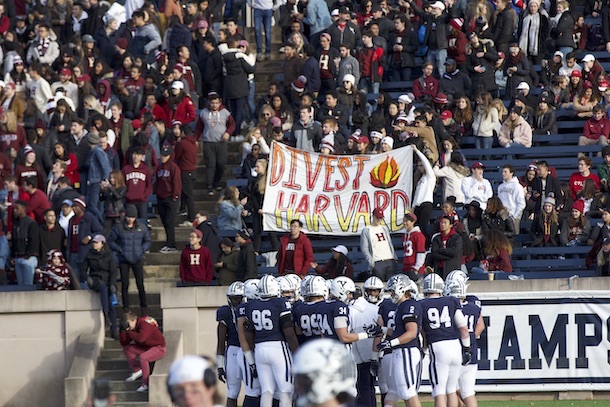Harvard Students and Faculty Call for Divestment
Air Date: Week of March 6, 2020

Students calling for Harvard to divest from fossil fuels hold up a sign at a Harvard University football game. (Photo: Courtesy of Caleb Schwartz)
Students at Harvard are calling on the university to divest its $41 billion endowment from fossil fuels, and over 1000 Harvard faculty members have signed a petition in support of divestment. Living on Earth’s Jenni Doering sat down with Caleb Schwartz, a senior at Harvard College and member of the Fossil Fuel Divest Harvard movement, to discuss why he and his peers believe their institution has a moral responsibility to divest from fossil fuels, and the implications of divestment on a broader scale.
Transcript
DOERING: Students concerned about climate change are making a case for divesting their university endowments from fossil fuels. Already over a thousand institutions, including pension funds and faith groups, have begun divesting from coal, oil, and gas, totaling an estimated $14 trillion in commitments. Students at Harvard have been calling for divestment for years, and they’re pushing Harvard to divest its massive endowment from fossil fuels by Earth Day 2020. Their professors have shown support for divestment as well: over 1000 Harvard Faculty members have signed a petition calling for it, and recently the Faculty of Arts and Sciences voted 179 to 20 in favor of divestment. President Lawrence Bacow has said the Harvard Corporation will make a decision on divestment by the end of the 2020 Spring Semester. Caleb Schwartz is a senior at Harvard College and an organizer for Divest Harvard, and he joins me now. Caleb, welcome to Living on Earth!
SCHWARTZ: Thank you so much for having me.
DOERING: So how much does Harvard University currently invest in the fossil fuel industry?
SCHWARTZ: That is a great question. We do not know how much Harvard University invests in the fossil fuel industry, what we do know is that Harvard University has a 40.9-billion-dollar endowment, which is larger than over half the world's country's annual GDP. There's a huge amount of money and anywhere between 1 and 2 percent of it is disclosed at any given time because Harvard University has to disclose some of its direct investments to the SEC. So in August, we analyzed the 1% that was disclosed at the time and found that out of that one percent 5.6 million dollars were invested directly in the fossil fuel industry and production or distribution. So those are the companies whose business model depends on selling fossil fuels. And if you were to scale that up to the entire endowment, that would be $560 million out of the entire endowment invested in the fossil fuel industry, which is really just a guess. It could be much more could have over a billion dollars invested in the fossil fuel industry. But really any amount would be too much.
DOERING: So in addition to asking for this change from the president, from the Harvard Corporation, what power do you as students have to actually change the system and ensure that your university divests from fossil fuels?
SCHWARTZ: Sure, yeah. So the question of student power is a really interesting one, because ultimately, this $40.9 billion endowment is in the hands of 12 people on the Harvard Corporation and that very small number of people, and we're not even really sure how those people are selected It’s not transparent. They're the ones who control the endowment. So, what we believe is in that student power can put a ton of pressure on those 12 people who are in charge and if we make you know enough of a noise and kind of enough of a strong moral argument that all of a sudden, you know, thousands more students will join into the movement and thousands of more alumni is and hundreds more faculty. And that is something that Harvard can't ignore when you have over 1,000 faculty members signed on to a divestment petition and when you have, you know, hundreds of students disrupting your largest football game. And you have really high profile alumni such as Al Gore and Desmond Tutu writing letters asking the university to divest. So we don't have any voting power over the endowment. But we are seeing this really inspiring movement of student power, not just in Harvard, but all around the country, of students really trying to put pressure on their universities to do the right thing. And we think based on historical examples, that it really can work.
DOERING: So you're making a strong moral case. To what extent do you think there's also a financial case for moving away from fossil fuel investments in university endowments?

Over Harvard 500 students rushed the field at the annual Harvard-Yale Football game in 2019 to disrupt the event and call for fossil fuel divestment. (Photo: Courtesy of Caleb Schwartz)
SCHWARTZ: Sure, yeah. So for us, the students, I think the moral case is the primary one that we're trying to make. I think that we recognize the climate crisis was created by the systems of finance and extraction and exploitation that currently are the dominant systems of our economy. So we want Harvard to divest for moral reasons. We don't think that we should live in a system where it's okay for a university to profit on the exploitation of the planet. But that being said, we also have the fortune that there is a very strong economic case to be made for the divestment of fossil fuels. In September, the University of California divested its endowment and pension funds, which totaled $80 billion. And said, basically, this was a purely economic decision. Now, that kind of reasoning was disappointing, obviously, for the activists of the University of California who had fought for years and years to win this battle. And I personally don't believe that that you know, economics was the only reason I think that it was really the hard work of activists to put this issue on the table. But when you have a highly regarded institution divesting $80 billion for economics, you know, that's something that you should pay attention to. So combined with the moral case, there is a really strong argument for Harvard to divest.
DOERING: So Caleb, what would divestment actually mean for students and faculty?
SCHWARTZ: So the university administration wants us to believe that divestment would hurt the operations of the university in some way that maybe students would have received less financial aid and faculty would receive less research money, but the truth is that Harvard is the wealthiest University In the country and world. So we don't believe that divestment seeing that fossil fuels are already a risky investment would actually hurt the operations of the university. And when the Harvard Corporation says that its fiduciary duty is to maximize the returns on its endowment, regardless of the morals of their investments, and that if they were to do anything less than get as much money as possible out of the market, then they wouldn't be doing their duty. We really question that sort of reasoning. And that's really troubling to us because its mission is not to make as much money as possible, its mission is to, you know, make the world a better place through its research activities and through the kind of scholarship it does. So investment in the fossil fuel industry is not making the world a better place. And the kind of, you know, economic reasoning that says we have to be invested in the fossil fuel industry it just really doesn't hold up.
DOERING: So make the case for the other side for me, why shouldn't Harvard divest?
SCHWARTZ: Sure. Yeah. So there are really two things I think about when I hear this question and one is that divestment is hard. You know, Georgetown University just committed to divesting its endowment, and it's going to take them about 10 years to really pull out of all these investments, we don't think that Harvard is going to be able to commit to their divestment tomorrow and then the next day, they'll, you know, say, okay, our endowment is Fossil Free. They, you know, use mutual funds and they're going to need to direct their money managers to find ways to pull out of the investment. So it's hard, it will cost some money, it might temporarily, you know, cost the endowment. But like we're saying, these investments are a huge risk. So that's one reason. The other reason, I think, gets kind of more into the politics of people governing the university. And if I am on the Harvard Board of Overseers, or I'm on the Harvard Corporation, and I have strong ties to the finance industry, or I'm a top lawyer for Exxon Mobil or I, you know, worked in banking, or I work in private industry, you know, I'm probably going to have connections to the fossil fuel industry in some way. And so if those people are to make these choices to divest the endowment. And then they go return to their hedge fund and try to do business with Shell, you know, the shell might be upset, they just say, Hey, you know, why did you take this moral stance against me in this other sector, you know, I'm out and do business. And we're able to look at all these figures, you can go on to the Harvard Divest website and see some of the connections that we pointed out between members of the corporation and the oil industry and say that this is not a trivial at all. These are people who have a vested stake in the continuation of the fossil fuel industry for personal reasons. And so they're gonna be less likely to take a stance. And really, if you think about Harvard as an institution, it's, you know, one of the oldest institutions in the United States, it might be the oldest Corporation in the Western Hemisphere. Their power is derived from this kind of institutional prestige. And they historically haven't been on the side of social progress because they're so tied to these investments that hold back social progress. So we're hoping it's going to be different this time.

Students at universities across the country have been calling for their institutions to pull their investments in fossil fuel companies since the fossil fuel divestment movement first gathered momentum in 2010. (Photo: Courtesy of Caleb Schwartz)
DOERING: I feel like I've heard this argument, you know, if we divest from fossil fuels it’s the slippery slope, we're gonna have to start divesting you know from prison structures. And all these other, you know, morally repugnant investments that we're in. How do you respond to that? What's your response to an institution like Harvard boking at divestment from fossil fuels? Because it is this like a slippery slope, where you'd have to then remove these other investments on moral grounds.
SCHWARTZ: So I think that kind of reasoning is really representative of what's broken about our financial system now. I mean, to say that the market is just going to do what it does. And we shouldn't really consider the morals of our investments are really wrong. It's putting our planet in jeopardy. Harvard has divested before from apartheid from tobacco from an oil company that was had connections to genocide in Darfur. There is a line that the Harvard management company has been willing to admit that if the investments are classified in its criteria, we don't know what its criteria are, but if it classifies a set of investments as morally repugnant and pass this line, it will divest, and it's saying fossil fuels are not past that line. So our question is, why not?
DOERING: Caleb Schwartz is a senior at Harvard College studying environmental science and public policy and a member of the Fossil Fuel Divest Harvard campaign. Thanks so much, Caleb.
SCHWARTZ: Thank you so much for having me. I really appreciate it.
DOERING: Harvard University declined to provide a spokesman to be interviewed, but they sent a statement from President Bacow that you can read on the Living on Earth website, loe.org.
Links
Click here to read more about the fossil fuel divestment movement at Harvard
Read more about Harvard University’s Climate Action Plan
Click here to see which institutions have committed to divestment from fossil fuels
Living on Earth wants to hear from you!
Living on Earth
62 Calef Highway, Suite 212
Lee, NH 03861
Telephone: 617-287-4121
E-mail: comments@loe.org
Newsletter [Click here]
Donate to Living on Earth!
Living on Earth is an independent media program and relies entirely on contributions from listeners and institutions supporting public service. Please donate now to preserve an independent environmental voice.
NewsletterLiving on Earth offers a weekly delivery of the show's rundown to your mailbox. Sign up for our newsletter today!
 Sailors For The Sea: Be the change you want to sea.
Sailors For The Sea: Be the change you want to sea.
 The Grantham Foundation for the Protection of the Environment: Committed to protecting and improving the health of the global environment.
The Grantham Foundation for the Protection of the Environment: Committed to protecting and improving the health of the global environment.
 Contribute to Living on Earth and receive, as our gift to you, an archival print of one of Mark Seth Lender's extraordinary wildlife photographs. Follow the link to see Mark's current collection of photographs.
Contribute to Living on Earth and receive, as our gift to you, an archival print of one of Mark Seth Lender's extraordinary wildlife photographs. Follow the link to see Mark's current collection of photographs.
 Buy a signed copy of Mark Seth Lender's book Smeagull the Seagull & support Living on Earth
Buy a signed copy of Mark Seth Lender's book Smeagull the Seagull & support Living on Earth

